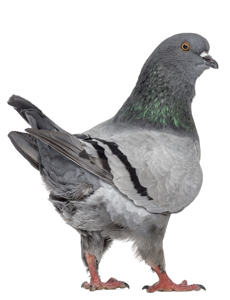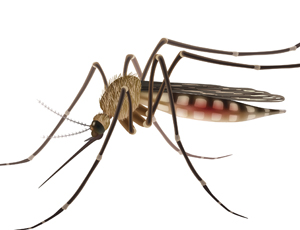View From the Bench
Workers’ Comp Docket

Exposure to Pigeon Droppings Results in Compensable Claim
Lankford v. Newton County, et al., No. SD34269 (Mo. Ct. App. 01/17/17)
Ruling: The Missouri Court of Appeals held that an investigator suffered a compensable occupational disease.
What it means: In Missouri, a worker does not have to establish an “unequal exposure” for an occupational disease claim. The worker must show that the disease he suffered is not an “ordinary disease of life to which the general public is exposed outside of the employment.”
 Summary: An investigator for the prosecutor’s office smoked in the employer’s basement. He began going to the roof of the building to smoke at the suggestion of an assistant prosecutor. He said that he preferred the roof because it was quiet, and he could think about the case he was working on. While on the roof, coworkers sought him out to talk about work-related matters.
Summary: An investigator for the prosecutor’s office smoked in the employer’s basement. He began going to the roof of the building to smoke at the suggestion of an assistant prosecutor. He said that he preferred the roof because it was quiet, and he could think about the case he was working on. While on the roof, coworkers sought him out to talk about work-related matters.
The roof was a popular place for pigeons, and pigeon droppings accumulated there. The investigator was diagnosed with chronic obstructive pulmonary disease. He was also diagnosed with diseases relating to the exposure to pigeon droppings.
He underwent surgery and had a stroke, which left him unable to work. The investigator filed a workers’ compensation claim, asserting that his exposure to pigeon droppings caused an injury to his lungs and respiratory system. Subsequently, the investigator died due to complications of pneumonia and COPD. The Missouri Court of Appeals held that the investigator’s occupational disease was compensable.
The employer argued that the investigator’s duties did not require his presence on the employer’s roof, and the employer did not receive a benefit from the investigator retreating from his job to the roof to be alone and smoke 10 times per day.
The court found that the investigator’s exposure to pigeons and pigeon droppings arose out of and in the course of his employment. Experts agreed that the investigator underwent lung surgery to treat the infection caused by the bird droppings. The court found that the evidence establishes that the investigator’s work activities caused the exposure to the infection.
Award of Benefits Does Not Confer Immunity to Coworker
Entila, et al. v. Cook, et al., No. 92581-0 (Wash. 01/12/17)
Ruling: The Washington Supreme Court held that a coworker was not immune from a third-party suit because he was not acting in the course and scope of his employment when the accident occurred.
What it means: In Washington, the fact that a worker received workers’ compensation benefits plays no role in determining a coworker’s immunity in a third-party suit.
Summary: A worker for Boeing finished work for the day and was walking across the employer’s access road when he was struck by a coworker who was driving his vehicle out of the employee parking lot. The worker received workers’ compensation benefits for his injuries and sued the coworker.
The coworker argued that he was immune from suit because he was acting in the course of his employment and Boeing’s employer immunity shielded him from liability. The Washington Supreme Court held that the coworker was not immune from suit.
The court explained that if an injured worker qualified for benefits, the employer cannot be sued. However, the worker’s receipt of benefits does not control third-party immunity. The court explained that a third-party coworker is not eligible for immunity unless he is in the “same employ” as the injured worker. “Same employ” can be shown when the coworker is acting in the course of employment.
The court sent the case back to the trial court.
Passing Mention of Soreness Does Not Constitute Notice of Work Injury
Ross v. American Ordnance, et al., No. 16-0787 (Iowa Ct. App. 01/11/17, unpublished)
Ruling: In an unpublished decision, the Iowa Court of Appeals held that a worker’s claim was barred because she failed to provide sufficient notice of her injury to her employer.
What it means: In Iowa, a worker must give her employer notice of an injury within 90 days unless the employer has actual knowledge of the injury.
Summary: A worker for American Ordnance claimed that she told her supervisor that she hurt her shoulder when a box fell over. The supervisor said that the worker said her shoulder hurt a little bit. The supervisor asked if she wanted to call an ambulance or see a doctor, but she declined.
The worker continued to have problems with her shoulder. She was eventually diagnosed with a torn rotator cuff that required surgery. More than 90 days after the alleged injury, the worker filed a workers’ compensation claim. The Iowa Court of Appeals held that her claim was barred because she failed to provide American sufficient notice of her claim.
The court found that the worker had to do more than tell the supervisor that her shoulder was sore. She did not tell him there was a reasonable possibility that her condition was related to her work. The court found that American did not have actual knowledge of a reasonable possibility that her injury was related to her work.
The worker argued that the discovery rule applied to her claim. Under the discovery rule, the 90-day notice period would not begin to run until the worker recognized the nature, seriousness, and probable compensable nature of the condition.
The court rejected the argument, finding that the worker recognized the nature, seriousness, and probable compensable character of her injury on the date it occurred, so she informed her supervisor at the time of her injury.
A dissenting judge found that the worker provided sufficient notice to the employer when she said that a box fell and that she hurt her shoulder. The judge pointed out that the supervisor responded by offering to call for an ambulance.
Worker Wins Benefits for Blackout Accident Caused by Non-Work Factors
Nuclear Diagnostic Products, 116 NYWCLR 211 (N.Y. W.C.B., Panel 2016)
Ruling: The New York Workers’ Compensation Board held that a driver, who crashed his work vehicle after losing consciousness while driving, sustained a compensable accident under the WCL.
 What it means: In New York, where a worker loses consciousness while driving the employer’s vehicle in the course of his employment, he is entitled to a presumption that his accident arose out of his employment.
What it means: In New York, where a worker loses consciousness while driving the employer’s vehicle in the course of his employment, he is entitled to a presumption that his accident arose out of his employment.
Summary: The board held that a driver who crashed his work vehicle after losing consciousness while driving sustained a compensable accident. The driver reported to hospital staff that he started coughing, lost control of the car, and then remembered someone waking him up after the accident.
He also reported that he had been coughing due to an asthmatic reaction to a new air freshener in his house. The board explained that because the driver’s accident occurred in the course of his employment he was entitled to a presumption that the accident arose out of his employment.
Although a review of the medical records indicated that the driver lost consciousness due to a coughing attack caused by his asthma condition, the driving of the employer’s vehicle was an added risk of employment. This added risk caused the injuries to his neck and back. Therefore, the driver’s claim was compensable.
Worker Denied Benefits for PTSD After Death of Infant Client
Griffin v. Luzerne County Children and Youth, 31 PAWCLR 233 (Pa. W.C.A.B. 2016)
Ruling: The Pennsylvania Workers’ Compensation Appeals Board affirmed the workers’ compensation judge’s decision denying benefits to a caseworker who alleged she sustained post-traumatic stress disorder and depression after the traumatic death of a young baby she was supervising.
What it means: In Pennsylvania, the traumatic death of a baby that a caseworker is supervising is not sufficiently extraordinary or unusual within the context of the caseworker’s specific employment to rise to the level of an abnormal working condition.
Summary: The board affirmed the WCJ’s decision denying benefits to a caseworker who alleged that she sustained post-traumatic stress disorder and depression after the traumatic death of a young baby she was supervising.
Evidence indicated the caseworker had been at the baby’s home and held the baby. After she left, the parents began drinking, and ultimately, the mom closed the baby in the recliner and left him there all night.
On appeal, the caseworker argued the WCJ erred in finding that she failed to establish abnormal working conditions. Rejecting this argument, the board explained that the events in this case, while indisputably tragic, were not found to be sufficiently extraordinary or unusual, within the context of the caseworker’s specific employment, to rise to the level of an abnormal working condition. The caseworker had to deal with abused and neglected children, and her agency was charged with reviewing these types of scenarios.
Relying on a prior case holding that the more fact intensive the inquiry, the more deference a reviewing court should give to the WCJ’s findings, the board found no sound basis for disturbing the WCJ’s decision.
Evidence Establishes That Mosquito Bite at Work Led to Compensable West Nile
Allen v. Graphic Packaging International, Inc., No. 51,080-WCA (La. Ct. App. 01/11/17)
Ruling: The Louisiana Court of Appeal held that an operator established a work-related accident when he was bitten by a mosquito and contracted West Nile encephalitis. The operator was entitled to temporary total disability benefits.
What it means: In Louisiana, work-related insect bites or stings can be a compensable accident under the workers’ compensation law.
 Summary: An assistant operator for Graphic Packaging International was sitting in the break room of the plant when he was bitten by a mosquito. Days later, he had fatigue and fever-related symptoms. He was eventually diagnosed with West Nile encephalitis. He filed a workers’ compensation claim. The Louisiana Court of Appeal held that he established a work-related accident.
Summary: An assistant operator for Graphic Packaging International was sitting in the break room of the plant when he was bitten by a mosquito. Days later, he had fatigue and fever-related symptoms. He was eventually diagnosed with West Nile encephalitis. He filed a workers’ compensation claim. The Louisiana Court of Appeal held that he established a work-related accident.
The court found that the operator showed it was more probable than not that he was bitten on the job by a mosquito carrier of West Nile. The widespread outbreak of West Nile throughout the area and the summer conditions supporting the mosquito population demonstrated that the operator was exposed to other mosquitoes in the days before and after the accident. Also, the evidence and common sense established that the operator was exposed to mosquitoes away from work.
However, the operator’s time in the plant during the week before he experienced symptoms allowed for a conclusion that he was probably bitten during his 56 hours at work. Large doors to the plant were open allowing for exposure of mosquitoes to workers.
Also, the operator worked early in the morning and later in the afternoon, which were times that mosquitoes were the most active as confirmed by experts. The operator also pointed out that a coworker also contracted West Nile at work.
The court found that the operator was not entitled to permanent and total disability benefits before a proper evaluation of rehabilitation possibilities. The court found that he was temporarily totally disabled.










